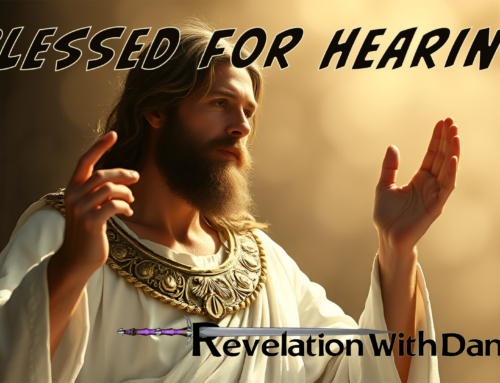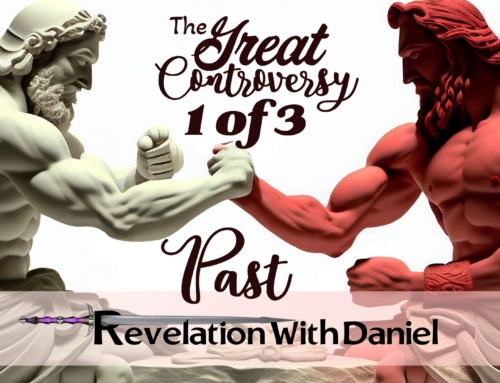 Is Jesus Almighty God?
Is Jesus Almighty God?
A question I’ve received often by many sincere, truth-seeking individuals is: Is Jesus the Almighty God spoken of in the Bible? The short answer, I tell them, is no. Of course, there are some difficult passages with which to wrestle, so in this brief article, I intend to tackle this matter and, hopefully, provide the reader a definitive answer that is easily understood and easy to explain. However, to answer this question with biblical soundness, we must answer a couple of other questions, first. So, let’s begin this study in God’s word by asking what is probably the simplest question of all to answer:
Is Jesus the Son of God?
Now, the answer to this very simple question is an undeniable and emphatic, Yes! More than 20 times Jesus is directly, and without need of any interpretation, called the Son of God in the Bible. Yet, for the sake of space, I will only give two witnesses of scripture to establish this truth that Jesus is in fact the Son of God.
Please read Matthew 14:33, where we see Jesus’ disciples clearly proclaiming the truth that Jesus is the Son of God.
Then they that were in the ship (referring to Jesus’ disciples, who were eyewitnesses to Him walking on the water) came and worshipped him (speaking of Jesus, who was walking on the water to come to them who were in the ship), saying, Of a truth thou art the Son of God.
Then in Matthew 16:15, we read where Jesus, Himself, asks the disciples: “Whom say ye that I am?” Although Jesus was speaking to all of them, let’s look at the only answer we have recorded—that of Peter—in verses 16 and 17:
And Simon Peter answered and said, Thou art the Christ, the Son of the living God. And Jesus answered and said unto him, Blessed art thou, Simon Barjona: for flesh and blood hath not revealed [it] unto thee, but my Father which is in heaven. (Mat 16:16-17 KJV)
So, right here in this passage of Scripture, we see Peter not only stating Jesus is the Christ, the Son of the living God, but also we see Jesus Himself confirming this truth by telling Peter he is blessed, because he did not gain this understanding or revelation by man’s teachings. Rather, the truth that Jesus is the Son of God was revealed to Peter by the Father—the “only true God” (cf. Jn 17:3). In other words, we have three sources of confirmation that Jesus is the Son of God right in this one passage of Scripture: Peter, Jesus Himself, and the Father.
So, with this sound, biblical evidence, how can folk draw the conclusion Jesus is anyone other than the Son of God? Unfortunately, some believe the Sonship of Jesus is a metaphorical concept; that these two divine beings (three, if you include the Holy Spirit as a being, which the Bible doesn’t), in a sense, flipped a coin to see who would play what role. This now brings us to the next question, which is:
Is Jesus God?
The answer to this question is not an “either-or” type of question, such that we answer, “yes” or “no”. Rather, this question needs to be approached with a biblical Hebrew mindset, whereby we conclude a “both-and” type of response. What do I mean by this? Well, when asked, the question, “Is Jesus God?” the answer is really both yes and no. Now, before folk begin to throw stones, please hear me out.
Yes, Jesus is God, in that, He is divine—He is Deity (cf. Jn 1:1; Heb 1:8). However, please understand: Jesus is the Son of God. Remember, all throughout the Gospels, Jesus only ever pointed people to His Father, whom He called “the only true God” (Jn 17:3), even though there were numerous opportunities for Him to confess Himself as the God of Abraham, Isaac, and Jacob. Please examine the following passage from Mark 12:29, 30, 32-34:
And Jesus answered him, The first of all the commandments [is], Hear, O Israel; The Lord our God is one Lord: And thou shalt love the Lord thy God with all thy heart, and with all thy soul, and with all thy mind, and with all thy strength: this [is] the first commandment. … And the scribe said unto him, Well, Master, thou hast said the truth: for there is one God; and there is none other but he: And to love him with all the heart, and with all the understanding, and with all the soul, and with all the strength, and to love [his] neighbour as himself, is more than all whole burnt offerings and sacrifices. And when Jesus saw that he answered discreetly, he said unto him, Thou art not far from the kingdom of God. And no man after that durst ask him [any question].
In speaking with this scribe, Jesus gave no indication there is any God—in fact, He quotes the Shema and clearly points out that “one” really means “one”—but the Father, whom the scribe called, the “one God; and there is none other but he.” It is in this sense the answer to the question of whether Jesus is God is, no.
So, if Jesus and the scribe both are pointing to the Father as being the only God, then what of Jesus? First, let’s begin by examining John 1:1, which I have done in a prior article.
In the beginning was the Word, and the Word was with God, and the Word was God.
This is indeed a beautiful passage establishing the divinity of the Son, and yet, we must examine it carefully, if we are to fully understand what it is and isn’t saying. Now, if the Word was God, how could the Word be with God? This kind of thinking causes us to take pause and possibly even have our minds go into tilt.
The literal Greek reading of the final phrase in Verse 1 is, kai theos hen ho logos, which means, “and God was the Word.” The previous phrase, pros ton theon, means, “with the God,” which all but a few modern, English translations have omitted. We find the same concept and format in 1 John 1:2, pros ton Patera, which translates to “with the Father.” Thus, “the Word was with the Father,” which identifies the Father as the God. The use of the definite article, “the”, is all-important, because it distinguishes between identity and quality. Notice also, John did not write, “the God was the Word.”
Understanding the idea of divine nature in this sense, therefore, helps us examine John 1:1 in a more correct manner:
In the beginning was the Word, and the Word was with the Deity, and the Word was Deity.
Examining the Greek in this manner clearly demonstrates two distinct persons with a literally begotten Son, who is Himself divine. Here we see the Son is God by nature, but not in name, that is, He is not the Father or, as both Jesus and Paul stated, “the only true God” (Jn 17:3) and “the one God” (1 Cor 8:6), respectively. Thus, we conclude, the Son is not a lesser God than the Father in terms of divine nature; rather, He is simply not the Sovereign of the Universe—the true and living God.
Of course, many people will, no doubt, bring up the passage in Hebrews Chapter 1; specifically, verse 8. So, let’s look at this verse.
But unto the Son he saith, Thy throne, O God, is for ever and ever: a sceptre of righteousness is the sceptre of thy kingdom.
Now the phrase “But unto the Son he saith,” lets us know the Father Himself is speaking these words about Jesus and is clearly and undeniably declaring Him to be God! Here is where many would stop and state, “There, you see! Jesus is God!” But, wait a second…look at the next verse:
Thou hast loved righteousness, and hated iniquity; therefore God, even thy God, hath anointed thee with the oil of gladness above thy fellows.
Here, the Father continues to speak; look at what He says regarding the Son: Jesus has a God, and it’s the God who anointed the Son, such that He, too, is divine. The Greek word in both instances is, theos, but the usage and grammatical structure demonstrate the Father’s superiority. What we see is the Father making it clear He is the God of the Son, who Himself is God, and this is corroborated by the following passages of Scripture:
Jesus saith unto her, Touch me not; for I am not yet ascended to my Father: but go to my brethren, and say unto them, I ascend unto my Father, and your Father; and to my God, and your God. (Jn 20:21)
But I would have you know, that the head of every man is Christ; and the head of the woman is the man; and the head of Christ is God. (1 Cor 11:3)
At that time Jesus answered and said, I thank thee, O Father, Lord of heaven and earth, because thou hast hid these things from the wise and prudent, and hast revealed them unto babes. (Matt 11:35)
Ye have heard how I said unto you, I go away, and come again unto you. If ye loved me, ye would rejoice, because I said, I go unto the Father: for my Father is greater than I. (Jn 14:28)
And about the ninth hour Jesus cried with a loud voice, saying, Eli, Eli, lama sabachthani? that is to say, My God, my God, why hast thou forsaken me? (Matt 27:46)
Jesus said unto them, If God were your Father, ye would love me: for I proceeded forth and came from God; neither came I of myself, but he sent me. (Jn 8:42)
For as I passed by, and beheld your devotions, I found an altar with this inscription, TO THE UNKNOWN GOD. Whom therefore ye ignorantly worship, him declare I unto you. God that made the world and all things therein, seeing that he is Lord of heaven and earth, dwelleth not in temples made with hands; (Act 17:23, 24)
Thus, the Bible teaches Jesus is 100-percent God, that is, He is Divine. However, this does not mean what many think it to mean, which is, Jesus is the One True and Only Almighty God of the Bible. So, let’s now carefully explore the question many have asked me of late:
Is Jesus Almighty God?
In other words, does the Father’s proclamation in Hebrews 1:8 automatically make Jesus, the Son of God, to be the One True and Only Almighty God? To put it yet another way: Does this passage of Scripture in Hebrews 1:8, 9 teach the trinity doctrine, such that Jesus is co-equal and co-eternal with the Father, or that He is the Almighty, simply because the verse states Jesus is God?
Now, anyone who truly believes in the trinity doctrine will affirm the Father is not the Son, and that Jesus, the Son of God, is not the Father. Some Christian theologians, as well as many mainline churches, dogmatically demand, because the Bible teaches there is only one God in three persons, and Jesus is called God in Hebrews 1:8, 9, that this proves Jesus is Almighty God. Even many Seventh-day Adventists have accepted this idea, although the Bible gives no hint of such a thing; rather, they draw their conclusions by a crutch—a misreading of the writings of Ellen White, whom many put on par with canonized Scripture. Although Sister White’s writings are indeed inspired, they cannot go contrary to the canon of the sacred text. If there is an apparent contradiction between her writings and the Bible, then it’s the reader who is in error and who needs to dig deeper.
So, what does the Word of God really teach regarding this matter? The Bible is clear there can be only one Almighty God, who is above all other gods. This is what the term, almighty, means. The Only True God, who is all mighty, must unequivocally be the highest God over all other gods. You simply cannot have a divine being, who is over or higher or greater than the God of the Bible, who Himself is almighty.
Let’s now carefully examine the Scripture so we can put the matter to rest. We’ll look at the context of Hebrews 1:8, where the Father undeniably calls Jesus, God; we’ll look at verses five through nine.
For unto which of the angels said he at any time, Thou art my Son, this day have I begotten thee? And again, I will be to him a Father, and he shall be to me a Son? And again, when he bringeth in the firstbegotten into the world, he saith, And let all the angels of God worship him. And of the angels he saith, Who maketh his angels spirits, and his ministers a flame of fire. But unto the Son [he saith], Thy throne, O God, [is] for ever and ever: a sceptre of righteousness [is] the sceptre of thy kingdom. Thou hast loved righteousness, and hated iniquity; therefore God, [even] thy God, hath anointed thee with the oil of gladness above thy fellows.
Therefore, clearly seeing Jesus is divine, and clearly seeing the Father is the God over his Son, the context of this passage should expel any doubt, whatsoever, Jesus is not the One True and Only Almighty God. That epithet belongs to the Father alone. Now some might argue and say, “What about other verses in the Bible that suggest Jesus is the Almighty?” To answer this question, we will need to look at several passages of Scripture throughout the Old and New Testament.
Let’s begin by examining Genesis 17:1, an oft-cited verse arguing Jesus is the Almighty.
And when Abram was ninety years old and nine, the LORD appeared to Abram, and said unto him, I am the Almighty God; walk before me, and be thou perfect.
Before we look at the verse itself, I want to focus on the word, LORD, which is what is known as the tetragrammaton in the Old Testament, and denoted by four Hebrew letters (יהוה), which in English would be written YHWH. The term is from the Greek and simply means a word with fours; it has come to denote the One and Only True Almighty God. In the Hebrew, this is the ineffable name of God. Over time, vowel pointings were added, which, when read or spoken, was the name we now understand to be Jehovah.
In Genesis 17:1, and other verses with the tetragrammaton, the name YHWH nearly always refers to the God, or the One True God, or more specifically, the only wise Almighty God, and none else. This will become clearer, as we move through this study. For now, it’s imperative to understand the LORD (YHWH) in Genesis 17:1 refers to the God, who was and is and is to come, the Almighty (cf. Rev 4:8).
Some Christians, who teach the philosophical doctrine of the trinity, might say this verse must be speaking of Jesus, because the word of God also says, “No man hath seen God at any time” (Jn 1:18), and Abraham is apparently seeing someone, who says He is the Almighty. I believe, when it states, “the LORD appeared to Abram”—who is clearly a man—it means Abram didn’t see God or Jesus (even if He were the Almighty God). Rather, what I understand the verse to be telling us is, Abram heard the voice of the LORD, who spoke to him; perhaps he saw the LORD God in a vision, so that his eyes would be opened to the spiritual world he was getting ready to see. Also, if Abram did indeed see a vision, we cannot deduce a description of the Almighty, only that he heard the voice.
In Hebrew, “appeared” has various meanings, and the core meaning is, to be made known, to realize, to perceive, to have vision, or to know. And, though it is true on several occasions this word is translated as pertaining to physical sight, I do not see this being the case in Genesis 17:1. If this word were to mean man saw Almighty God with his physical eyes, then the question is begged, “How can the physical eyes of a man actually see that which is invisible?” Likewise, if Abram saw Almighty God, then this would contradict other parts of the Bible that clearly teach no man has ever seen God or even can see Him. Those who teach the trinity doctrine and insist this verse must be speaking of the pre-incarnate Jesus—because no man has seen God; thus, proving Jesus is Almighty God—set up a strawman that makes absolutely no sense. If no man has seen God at any time, then Abram did not see Jesus, either, even if Jesus were Almighty God.
Now this might sound a little confusing, but if you will suffer with me, it will all become crystal clear. We must bear in mind, an Almighty God cannot have another God over Himself, because that would make the God over Him to be mightier or greater than Himself and, therefore, He would not be the all mighty one or the highest God over all other gods. And, clearly, Jesus has a God over Him, as we’ve already read. Thus, Jesus is the Son of the One True and Only Almighty God, and that God is His father.
Another witness from the scriptures confirming the Father is the Almighty God is found in Genesis 35:9-11, where we see He appeared to Jacob a second time:
And God appeared unto Jacob again, when he came out of Padanaram, and blessed him. And God said unto him, Thy name [is] Jacob: thy name shall not be called any more Jacob, but Israel shall be thy name: and he called his name Israel. And God said unto him, I [am] God Almighty: be fruitful and multiply; a nation and a company of nations shall be of thee, and kings shall come out of thy loins.
Here again, “appeared” means Jacob simply heard the voice of Almighty God and realized or perceived this was Almighty God speaking to him. The Scriptures must agree; therefore, any interpretation stating any man literally saw God would contradict the clear words of Jesus Himself, who teaches us no man has seen God. Thus, the line of reasoning, declaring no man has seen God, does not prove this verse must be speaking of Jesus being a manifestation of the Almighty God, who appeared to Jacob. In addition, one cannot logically conclude Jesus is Almighty God manifesting Himself in the form of a man that men could see. This line of reasoning also contradicts the clear word of God that teaches us no man can see God. Think this through for yourself: If Jesus truly is Almighty God and no man has seen God, then it would be impossible for Jacob to have seen Jesus, either, if He truly were Almighty. Some have even told me there is a differentiation between God and Almighty, which, therefore could mean Jesus is the Almighty in this passage and in Genesis17:1. If this were the case (and it’s not), then Jesus would be greater than His Father, and we’ve already seen this is not the case.
There are numerous other verses we can examine, but the one I wish to dissect is Revelation 1:8, which reads:
I am Alpha and Omega, the beginning and the ending, saith the Lord, which is, and which was, and which is to come, the Almighty.
Anyone who has a red-letter edition of the Bible, might see one of the following:
I am Alpha and Omega, the beginning and the ending, saith the Lord, which is, and which was, and which is to come, the Almighty.
I am Alpha and Omega, the beginning and the ending, saith the Lord, which is, and which was, and which is to come, the Almighty.
I am Alpha and Omega, the beginning and the ending, saith the Lord, which is, and which was, and which is to come, the Almighty.
The one thing we need to understand right from the start is, the red letters are not inspired. These are what scholars and editors believe Jesus to have said. Some areas are clear-cut with no debate; others are up for interpretation, with as many different ideas as there are those who present them. That said, which one is the correct one, in terms of our understanding the verse, correctly? My opinion is, the third one—Jesus is speaking the entire time.
So, what is being said in this verse? Is Jesus making a declaration He is the Almighty? Absolutely not! What Jesus is saying in the verse is, He is indeed Alpha and Omega, and yet, He’s saying it’s His Father (whom He is quoting), the eternal one, who has made this declaration. In other words, the verse should be understood, as follows:
I am Alpha and Omega, the beginning and the ending, says my Father, who is, and who was, and who is to come—the Almighty.
This understanding fits in nicely with similar passages in Revelation 1:4 and 4:8:
John to the seven churches which are in Asia: Grace be unto you, and peace, from him which is, and which was, and which is to come; and from the seven Spirits which are before his throne;
And the four beasts had each of them six wings about him; and they were full of eyes within: and they rest not day and night, saying, Holy, holy, holy, Lord God Almighty, which was, and is, and is to come.
Both passages clearly refer to the Father. It’s clear in Revelation 1:4, because in verse five, John builds upon verse four and differentiates by introducing the conjunction, “and”, followed by the prepositional phrase, “from Jesus Christ.” A basic understanding of English (and this is meted out in the Greek, too) shows the one “which is, and which was, and which is to come,” before whose throne are the seven spirits, cannot be the very next individual to whom John refers, and that is Jesus. To conclude Jesus is the one to whom John referred in verse four not only would be an illogical error of great pity, but even more so an egregious error of self-deception.
Revelation 4:8 clearly refers to the Father, because the entire chapter is the preparation for the inauguration of the Lamb—Jesus—who doesn’t appear until Chapter 5. Again, to remotely believe the passage of 4:8 refers to Jesus demonstrates a pathetic lack of analysis, as well as an abuse of the Scripture. Therefore, in Revelation 1:8, Jesus is essentially quoting what the Father had said about His Son; in turn, Jesus is telling John.
At this point, no further explanation is required. Unfortunately, there are those who will continue to try and shove a square peg into a round hole, despite the clear Bible evidence. Seventh-day Adventists, who hold to the trinity doctrine, despite the clear scriptural evidence to the contrary, will attempt to use Ellen White’s writings to support their position. Unfortunately, they usually highlight passages taken out of their context or not properly analyzed to ensure they’re correctly interpreted. The bottom line is, no matter how one might insist Jesus is the Almighty God, the Bible says, No. Likewise, Ellen White says, No.
Friends, please carefully consider what I have shared in this article, especially those who hold on to the idea Jesus is God Almighty. In doing so, you are at best saying the Son of God is Himself co-equal to His Father; at worst, you are stating Jesus is greater than His Father. Both ideas are blasphemy and a violation of the first commandment. Further, embracing this false teaching nullifies the first angel’s message of Revelation 14:7, which, if not properly understood—regardless of the fact one might claim to be a remnant Seventh-day Adventist—will result in accepting the Mark of the Beast. The final test for God’s people is about whom we worship, which is even more important than the day upon which we rest, remember, and worship. Remember Daniel Chapter 3: Only three did not bow to the false image, and yet, those who did (of the aristocracy of Israel) claimed to be God-fearing Jews—they, too, were Sabbath-keepers. Considering this, let us ensure we correctly identify the God of the Bible: He is our Father in Heaven, to whom Jesus taught us pray.
In the Blessed Hope,
Phillip Triebskorn







Please Clarify Isa, 9:6
For unto us a Child is born,
Unto us a Son is given;
And the government will be upon His shoulder.
And His name will be called
Wonderful, Counselor, Mighty God,
Everlasting Father, Prince of Peace.
This Child is also called Everlasting Father?
Please consider a response from JH Waggoner from the 1880’s:
“In seeking an explanation of this text, we must bear in mind the work of Christ as brought to view in this and parallel passages. These words refer to the “child born,” the “son given,” who, as we have seen, bears the title of God subordinate to his Father. And if an apostle could call himself the father of those whom he had begotten in the gospel (1 Corinthians 4:15; 1 Timothy 1:2; Titus 1:4), how appropriately is this title applied to the Prince of Peace, who is, in a peculiar sense, the everlasting Father of all to whom he gives everlasting life. The New Jerusalem is called the Bride, the Lamb’s wife (Revelation 21); Christ of course is the Bridegroom, the husband. But Paul says Jerusalem above is our mother. Galatians 4:26. If so, why not her husband, the bridegroom, be our father? Surely there is nothing inappropriate in this. But, as the New Jerusalem is not the mother of the unregenerate, these being reckoned the children of the bondwoman, so Christ is not called their father. They are not his children, and he does not give them everlasting life. Therefore the title is applied to him in a subordinate and restricted sense. In its unrestricted and universal sense it applies only to the Supreme One, “the God and Father of our Lord Jesus Christ.” 2 Corinthians 11:31; Ephesians 1:3; 1 Peter 1:3.” AERS 169.1
Good Question Bro…
What a great and wonderful analysis bro..!!? It’s Amazing and Awesome
Praise God!